- Home
- Michael Anderle
Payback Is A Bitch (The Kurtherian Endgame Book 1) Page 16
Payback Is A Bitch (The Kurtherian Endgame Book 1) Read online
Page 16
“If you count fifteen seconds as early,” Thomas grumped.
Michael sat down. “Of course I do,” he replied. “I’m not fond of being late.” He reached over and touched her arm. “Education?”
“Yes,” she admitted. “I asked Peter here because he might remember his wild days back on Earth. I want to discuss a few of my thoughts, and concepts, then I will go off and talk with more of the experts.” She nodded to her right. “Stephen will represent business interests and the Admiral will represent the military. Peter will speak for the young even though he is over a hundred and seventy now himself, and Addix will represent those providing knowledge.”
“And me?” Michael asked. He seemed neither pleased nor upset with being part of this.
“Accumulated knowledge,” she replied.
Planet Soboth (Previously Territory 7732), Undisclosed location, Open Out-ring, Non-Federation
Az pushed his normal work aside and lifted a tablet he had been carrying lately. With no one present in his office, he touched the button and allowed the tablet to scan his eyes.
The security screen closed.
He glanced through the notes and messages, nodding his head at each. He stopped on one, frowned before leaning forward and punching a button on his desktop.
“Uleq here.”
“Uleq, Az.” He glanced down at this tablet. “I want you to have our military supply group on Goptek Minor close up Warehouse 19 and clean out all other warehouses. Have them leave 19 alone before they ship everything to Goptek Major, and support that location for a year. We aren’t seeing enough value from two separate staging areas.”
“They won’t be able to accomplish this project for at least a week. There are about twenty-five warehouses full of product there, plus I’ll have to move two ships over to Minor. Do you approve these expenses?”
“Of course,” Az replied. “That’s the purpose long-term: reduce expenses.”
“Understood. Talk later.” Uleq closed the connection.
Az nodded and leaned back. He sent the coordinates of the missiles to his contact and told him it would be about a week before the cargo would be available.
—
Uleq severed the communication before pulling up the necessary contacts to implement the request. He checked the manifest of the warehouses in general and 19 in particular.
Food.
Specifically, canned food and foodstuffs. He shrugged. He wasn’t sure why Az didn’t want the food moved, but it could be he knew of a project or potential order coming. It wasn’t until he had sent all the commands “Per CEO Az” that he noticed that Warehouse Twenty-Seven, which was right next to 19, had missiles on the manifest.
High Tortuga, Hidden Space Fleet Base, the Pit, a Few Weeks Later
Bethany Anne outlined her plan. “Here is the basic premise: a world, nation, or community needs to have an educated populace. Education provides a common foundation for a trained workforce and a literate voting block who can have informed opinions, a method of explaining the basics of living with others harmoniously, and a stable tax base. The less educated will not hold the higher-paying positions, and therefore won’t provide well for their families or the help community by creating jobs or pay taxes on their income.”
“So…” She touched an icon on her screen and the inset video screens in front of everyone at the table and two screens on the video wall displayed what she was looking at so those working in the Pit could follow along. “The common foundations are usually linguistics, the objective sciences, common history and perhaps religious concepts the nation or nation-states require. The idea is that no matter the area of the country or how rich or poor, if someone is going to go into higher education the colleges and universities have some basic understanding of what an incoming student will know so they can base their classes on that.”
She nodded to Peter. “Now we get to the other side of the challenge. You will have children who have no desire to go through a foundational program since their wants, needs, and curiosity diverge from what society wants them to know. There are usually two ways they get their knowledge. One is expository, related to shoving information into a brain, and the other is experiential. Think of it as reading about trees versus going on a field trip to see trees up close and running one’s hand over the bark.”
She smiled. “The better of those methods, experiential, is often too hard to manage with many children.”
The images on the screens changed. “Further, the old classroom paradigm had already failed in the United States on many levels. Other countries had easily created programs which enhanced the prestige but not necessarily the income of teachers. Mind you, those teachers in other countries still made the country’s average salary until they were years into in their career, but they were actively recruited from the top quarter of students and trained in a demanding way so citizens knew teaching was difficult.”
She tapped the icon to change the slide. “I’m not going to let higher education off the hook, either. One of the great errors of an elite education in the United States was that it taught those attending to think that intelligence and academic achievement were measures of value in some moral or metaphysical sense, equating their value with their education. Further, there are many types of intelligence, but the ones supported were academic in scope. There was little understanding of the value of social, emotional, and artistic intelligence. Those who had intellectual intelligence promulgated their type at the expense of others.”
The slide changed. “Basically, what we see played out is the needs of the family, the community, the state, the nation, the world, and humanity in general arrayed against personal needs and desires natural to individuals seeking to get ahead for themselves or their families or their beliefs or groups they belong to. Some students, for reasons of curiosity, maturity, or family dynamics, were held back from achieving their education faster by the constraints of the system.”
“Mass manufacturing of an educated class,” Stephen remarked.
Bethany Anne nodded.
She tapped the screen and the image changed to a person wearing a simulation headset. “We now have a different methodology, including the opportunity for students to take classes at their own pace and for creating learning-pod groups of five students supporting each other to help each other get ahead. Those learning in certain areas can teach a concept to others, choosing how they teach. We had one student two years ago on the Meredith Reynolds who used songs to teach a semester of history. Not only did her pod ace the examinations, their resultant recording became a hit on the live-theater-adaptation circuit. Now there are other students doing this with popular and semi-popular music styles.”
The image changed again. “Teachers function as guides to allow the students opportunities to locate information. Practical and impractical requests are made of the pods, and they are ranked against each other in different areas. There is interaction at a one-on-one level, and social issues are rapidly addressed. EIs are in place to facilitate some level of privacy but reveal potential issues with students. Some naturally aggressive individuals, whether for reasons of chemical imbalances due to their physiology or just plain natural selection, are offered ways to work out that aggression. Likewise, those who wish to focus on one area are encouraged to earn time in that area by excelling in tangential but necessary areas of knowledge.”
“Carrot and stick?” the Admiral asked.
“Yes,” Bethany Anne replied. “I instituted a payment system for the children. If the parents weren’t involved enough, we billed the costs of teaching the child up to minimum standards to them, with notification that there was inadequacy on the parents’ part. Once the child was old enough, they were provided treats if they got ahead of schedule, or they would receive penalties if they just did the minimum required. There are always choices in life, and there are always repercussions. That is a basic training maxim that was wiped out in many schools. We taught them not to touch a hot pan when they were
two, but we didn’t teach them to fear the future enough to continue their education.”
Bethany Anne sat back. “Some countries—Germany was a leader, but many of the European countries did the same—pushed a career or vocational track in their school systems. It helped their younger students gain employment and higher-paying jobs at a better rate than many of their contemporaries. Unfortunately, if one studied the system over a few decades, it was the general education group who were ahead by their forties. In my opinion, what we need is a vocational track for early adult—whatever jobs interest them—and a general education track later so that they can keep up with skills and know how to learn should their professions become obsolete.”
“You could always,” Michael pointed out, “require service in exchange for government support.”
Bethany Anne turned to him. “Like what?”
“Let me ask you this first.” He pushed his tablet to the side. “What is the value of an hour’s worth of, say, a social scientist’s time versus someone who works the fields pulling peas?”
“It’s the effort,” Admiral Thomas answered, “of the social scientist to learn what they know to be able to give you an hour’s worth of their expertise. For those pulling peas, it’s the effort of standing in the hot sun and doing back-breaking work.”
“Who appreciates the peas more?” Michael asked.
“Well, typically those who pulled the crops ended up hating them,” Thomas answered. “Hell, I know I did. My grandparents had green bean fields. Looking back at it as an adult the rows probably weren’t more than a hundred feet long, but as a kid, they looked like a mile.”
“Okay,” Michael continued. Those at the table looked from one to the other as they worked on the problem. “But we have EI support. Most of the true effort is in the ability to put two different and possibly unrelated pieces of information together to work the problem. The creatives might become the new power brokers because their minds work differently—those who love to read all sorts of material.”
“Even fiction?” Stephen asked, thinking back to the comment about the military using science-fiction writers.
Michael raised an eyebrow. “Perhaps even fiction; I don’t wish to guess. My point is, throughout my life, using skills or talents or a person’s raw physical power to help them rise to the top of their society came and went. In the beginning, it was the strength in their arms to swing their swords. Then the tongue to sway large groups to accomplish something together. It became those who developed the sciences, and then—to a degree—it was those again who had physical prowess and could run or shoot a ball into a hoop. Yet, it was those who produced the food, built the homes, protected society, or taught the children or young adults who often weren’t supported. They would do their jobs, punch their time cards, and do what needed to get done to keep society going. My suggestion is to consider all work—if done well—equal. Government needs to be in place, but we’ll require some form of service as your debt to society. Perhaps you are a musician but can test into working with an R&D lab in the future. Can that be your service?”
“That,” Bethany Anne replied, “could be a nightmare. Just think about the ongoing effort for some of Jean Dukes’ stuff. There’s no way we could place a person into a project for two weeks and then they leave.”
Michael tapped a finger on the table. “I understand. However, let me give you a quote from a worker to Jack Welch.”
“Who?” Peter interrupted.
Stephen answered, “Jack Welch. He was the CEO of General Electric—GE—back on Earth in the twentieth century.”
Michael continued, “He was talking to the assembly line workers at one of their businesses and one of the men spoke up, telling Welch that ‘for twenty-five years you paid for my hands when you could have had my brain as well for nothing.’”
The table was quiet a moment, thinking about that.
Peter was the first to break it. “Makes sense. We use that concept in the Guardians all the time. Everyone has a role to play, but if you have ideas you need to speak up.”
“It would,” Addix added, “allow those interacting to bring new ways of thinking to perhaps old and worn-out strategies.”
“What about those who truly hated the notion?” Stephen asked. “I can think of a few.”
“I’m tempted to say ‘fuck ‘em.’” Bethany Anne snorted. “However, I know people, and they might fuck up the works. What about a ten-percent charge of their annual wealth if they wish to forego service?”
“Two weeks,” Michael interjected, “is at best four percent of their time.”
“Right,” Bethany Anne agreed, “so I’d suggest they do the two weeks. But if they want to they can lose ten percent of their annual wealth—which is not their annual income, because that shit can be hidden.”
The Admiral asked, “So a billionaire who technically made nothing during the year would owe a hundred million to get out of two weeks’ service?”
“Right,” Bethany Anne agreed. “And someone with fifty thousand owes five thousand.”
“Where does the money go?” Peter asked.
Admiral Thomas grinned. “I suggest the military.”
“Education?” Peter asked. “It’s just a suggestion, because that is what we are talking about.”
Stephen scratched his chin. “I can imagine large corporations putting income packages together for their upper-level executives to pay for this.”
“I suggest,” Bethany Anne added, “putting the names of those who opt out on a public list so everyone knows who isn’t working.”
“What about sickness, or a family illness they need to deal with?” Stephen countered.
“With Pod-docs we shouldn’t have that issue, but there would have to be some sort of schedule. Further, we will always have public projects. There are always roads to be built, gardens to be tended, or military camps where one can refresh one’s skills in case of war.”
Admiral Thomas opened his mouth, then turned to Peter. “Actually, I kind of like that.”
“Me, too,” Peter agreed and turned back to Bethany Anne, “Couldn’t we have multiple camps of that type?”
“Like what?” she asked.
“Well, maybe emergency services? People prepared to go help in case of natural disasters, or places where if they know enough they could help teach, right?”
Bethany Anne scratched her head, “I’m not saying no to this idea, but we would have to work out the details.”
Peter shrugged.
“Okay.” She tapped the button for the next screen. “I’d like to open up discussion on how to pay for education.”
18
High Tortuga, Hidden Space Fleet Base, The Pit, One Week Later
Bethany Anne pointed to the screen flashing red up on the wall. “Terry, pull up that location, confirm the information with the local authorities, and send in a small squad of Guardians. Tell the police to hold back if anyone is local to the area until the Guardians arrive.”
A minute later Terry, a blonde with brown eyes and a serious demeanor, called back to Bethany Anne from her second-tier location, “I’ve got confirmation from the local police that they will hold back, but they want to know why you have Guardians helping stop a bank heist?”
Bethany Anne grumped, “Because my group is a well-organized tac team and theirs often have their thumbs up their butt?”
“Ma’am?”
“No!” Bethany Anne shrugged. “Sorry. Because that’s my bank and I’m sending in official support. I don’t want casualties or a long standoff. I want this done quietly and efficiently.”
—
That is a go, Tac Team 01. Queen Bethany Anne says to neutralize the threat. There are three tangos, two in the main bank lobby, one in the bank trying to open a lockbox. Arrive on top of bank, drop down from roof…
“Understood, Pit,” Guardian Watson Stewart replied. “ETA thirty seconds.” He clicked off his mic. The Black Eagle had been holding position ten miles o
ut, hanging in the upper atmosphere. That way they could dart to where they were needed.
“Turn and burn?” his partner, Guardian Jesse Verette, asked as he pulled his pistol and checked it before sliding back into his holster.
“Nope,” Watson answered. The Black Eagle, an antigravity-driven two-person attack ship, sliced through the air towards the second smaller upthrust of skyscrapers into the sky. “Drop and stop.” He checked the countdown on the timer, then his pistol. “Three tangos, two using the customers as hostages and one trying to get into a locked safe deposit box in the vault.”
“Wonder what they’re up to?” Jesse mused as a green square popped up on the outer screen, highlighting an eight-story building in the distance.
Watson changed the arrival parameters. “I’m taking us in hot, so make sure you have your suit set appropriately.
“Oh, fucking hell!” Jesse slammed his helmet on his head and then started confirming that his suit was properly set up for a hot arrival. Watson put on his helmet and confirmed his settings as well.
A moment later, Jesse could hear Watson’s voice over the comm. “You got me?”
“Five by five,” Jesse replied.
“Then you might want to unbuckle…”
“Shit!” Jesse slapped the buckle on his chest, and two seconds later their Black Eagle flipped upside down and the cockpit opened. The two Guardians ejected via gravity.
Jesse’s HUD highlighted a black building, and the square on the ground was what they were heading towards. They had ejected half a mile up, and the maneuvering capabilities on their suits were pretty good. They could move in any direction while gravity pulled them towards the ground. At ten stories the antigrav kicked in and Jesse grunted. “DAAAAAMMMNN!”
Both men went from freefall to boots-down, touching down with the same sound as someone having jumped up and landed again. Both men checked the heat signatures inside the building with the thermal readers in their helmets.

 The Lone Ranger Returns
The Lone Ranger Returns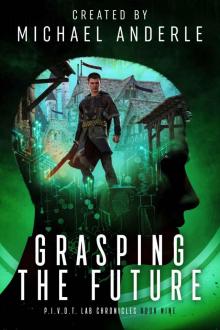 Grasping The Future
Grasping The Future Decision Made
Decision Made Rejected By Heaven: An Urban Fantasy Action Adventure (The Unbelievable Mr. Brownstone Book 2)
Rejected By Heaven: An Urban Fantasy Action Adventure (The Unbelievable Mr. Brownstone Book 2) Road Trip: BBQ And A Brawl (The Unbelievable Mr. Brownstone Book 19)
Road Trip: BBQ And A Brawl (The Unbelievable Mr. Brownstone Book 19)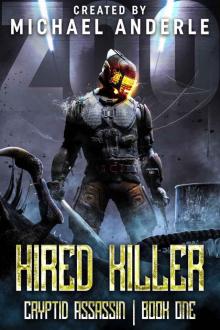 Hired Killer (Cryptid Assassin Book 1)
Hired Killer (Cryptid Assassin Book 1)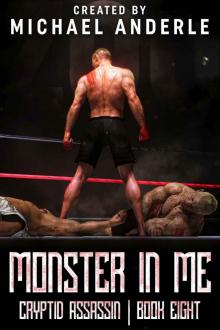 Monster In Me (Cryptid Assassin Book 8)
Monster In Me (Cryptid Assassin Book 8) The Kurtherian Endgame Boxed Set
The Kurtherian Endgame Boxed Set The Unbelievable Mr Brownstone Omnibus
The Unbelievable Mr Brownstone Omnibus The Caitlin Chronicles Boxed Set
The Caitlin Chronicles Boxed Set Unfaithful Covenant
Unfaithful Covenant The Valkyrie Returns (The Kurtherian Endgame Book 7)
The Valkyrie Returns (The Kurtherian Endgame Book 7) Enter Into Valhalla
Enter Into Valhalla Road Trip: BBQ Delivered with Attitude (The Unbelievable Mr. Brownstone Book 20)
Road Trip: BBQ Delivered with Attitude (The Unbelievable Mr. Brownstone Book 20) One Dark Future
One Dark Future Fatal Mistake: An Urban Fantasy Action Adventure (The Unbelievable Mr. Brownstone Book 11)
Fatal Mistake: An Urban Fantasy Action Adventure (The Unbelievable Mr. Brownstone Book 11) How To Be A Badass Witch: Book Two
How To Be A Badass Witch: Book Two Rogue, Renegade And Rebel (In Her Paranormal Majesty’s Secret Service Book 1)
Rogue, Renegade And Rebel (In Her Paranormal Majesty’s Secret Service Book 1) Desperate Measures
Desperate Measures Shadow Of The Ring: An Urban Fantasy Action Adventure (The Unbelievable Mr. Brownstone Book 16)
Shadow Of The Ring: An Urban Fantasy Action Adventure (The Unbelievable Mr. Brownstone Book 16) Collecting The Goddess (Chronicles Of KieraFreya Book 1)
Collecting The Goddess (Chronicles Of KieraFreya Book 1) Investigating Deceit
Investigating Deceit One Epic Ring: An Urban Fantasy Action Adventure (The Unbelievable Mr. Brownstone Book 14)
One Epic Ring: An Urban Fantasy Action Adventure (The Unbelievable Mr. Brownstone Book 14) One Bad Decision
One Bad Decision A New Dawn- Complete series
A New Dawn- Complete series Tales from the Kurtherian Universe: Fans Write For The Fans: Book 3
Tales from the Kurtherian Universe: Fans Write For The Fans: Book 3 Witch Of The Federation III (Federal Histories Book 3)
Witch Of The Federation III (Federal Histories Book 3) Solyrian Conspiracy - C M Raymond & L E Barbant
Solyrian Conspiracy - C M Raymond & L E Barbant Hail To The King: An Urban Fantasy Action Adventure (The Unbelievable Mr. Brownstone Book 8)
Hail To The King: An Urban Fantasy Action Adventure (The Unbelievable Mr. Brownstone Book 8) Kurtherian Gambit Boxed Set Three: Books 15-21, Never Submit, Never Surrender, Forever Defend, Might Makes Right, Ahead Full, Capture Death, Life Goes On (Kurtherian Gambit Boxed Sets Book 3)
Kurtherian Gambit Boxed Set Three: Books 15-21, Never Submit, Never Surrender, Forever Defend, Might Makes Right, Ahead Full, Capture Death, Life Goes On (Kurtherian Gambit Boxed Sets Book 3) Karma Is A Bitch: An Urban Fantasy Action Adventure (The Unbelievable Mr. Brownstone Book 12)
Karma Is A Bitch: An Urban Fantasy Action Adventure (The Unbelievable Mr. Brownstone Book 12) How to be a Badass Witch
How to be a Badass Witch Witch Of The Federation (Federal Histories Book 2)
Witch Of The Federation (Federal Histories Book 2) Finish What You Started
Finish What You Started Cabal of Lies
Cabal of Lies Defending the Lost
Defending the Lost Tales from the Oriceran Universe: Fans Write For The Fans: Volume 1 (Oriceran Fans Write For the Fans)
Tales from the Oriceran Universe: Fans Write For The Fans: Volume 1 (Oriceran Fans Write For the Fans) Too Young to Die
Too Young to Die Silent Death (Cryptid Assassin Book 2)
Silent Death (Cryptid Assassin Book 2) The Horsemen Gather: An Urban Fantasy Action Adventure (The Unbelievable Mr. Brownstone Book 17)
The Horsemen Gather: An Urban Fantasy Action Adventure (The Unbelievable Mr. Brownstone Book 17) Animus series Boxed Set
Animus series Boxed Set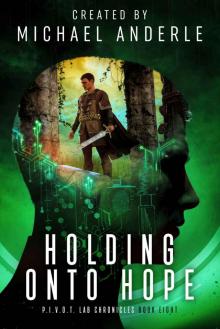 Holding Onto Hope
Holding Onto Hope The Unbelievable Mr. Brownstone Boxed Set One (Books 1-3): Feared By Hell, Rejected By Heaven, Eye For An Eye (The Unbelievable Mr. Brownstone Boxed Sets)
The Unbelievable Mr. Brownstone Boxed Set One (Books 1-3): Feared By Hell, Rejected By Heaven, Eye For An Eye (The Unbelievable Mr. Brownstone Boxed Sets) Enlightened Ignorance
Enlightened Ignorance Dawn Arrives (The Second Dark Ages Book 4)
Dawn Arrives (The Second Dark Ages Book 4) Revolution - C M Raymond & L E Barbant
Revolution - C M Raymond & L E Barbant Vax Humana: An Urban Fantasy Action Adventure (The Unbelievable Mr. Brownstone Book 13)
Vax Humana: An Urban Fantasy Action Adventure (The Unbelievable Mr. Brownstone Book 13) Kurtherian Gambit Boxed Set One: Books 1-7, Death Becomes Her, Queen Bitch, Love Lost, Bite This, Never Forsaken, Under My Heel, Kneel or Die (Kurtherian Gambit Boxed Sets)
Kurtherian Gambit Boxed Set One: Books 1-7, Death Becomes Her, Queen Bitch, Love Lost, Bite This, Never Forsaken, Under My Heel, Kneel or Die (Kurtherian Gambit Boxed Sets) The Kurtherian Endgame Boxed Set: Books 1 - 4 - Payback is a Bitch, Compelling Evidence, Through the Fire and Flame, All's Fair in Blood and War
The Kurtherian Endgame Boxed Set: Books 1 - 4 - Payback is a Bitch, Compelling Evidence, Through the Fire and Flame, All's Fair in Blood and War She Is The Widow Maker: An Urban Fantasy Action Adventure (The Unbelievable Mr. Brownstone Book 5)
She Is The Widow Maker: An Urban Fantasy Action Adventure (The Unbelievable Mr. Brownstone Book 5) When Angels Cry: An Urban Fantasy Action Adventure (The Unbelievable Mr. Brownstone Book 6)
When Angels Cry: An Urban Fantasy Action Adventure (The Unbelievable Mr. Brownstone Book 6) Through The Fire and Flame (The Kurtherian Endgame Book 3)
Through The Fire and Flame (The Kurtherian Endgame Book 3)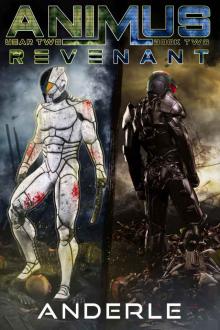 Revenant
Revenant Never Forsaken (The Kurtherian Gambit Book 5)
Never Forsaken (The Kurtherian Gambit Book 5) Alison Brownstone: An Urban Fantasy Action Adventure (The Unbelievable Mr. Brownstone Book 9)
Alison Brownstone: An Urban Fantasy Action Adventure (The Unbelievable Mr. Brownstone Book 9) The Dark Messiah
The Dark Messiah How To Be A Badass Witch: Book Three
How To Be A Badass Witch: Book Three War Of The Four Worlds
War Of The Four Worlds Fight Fire With Fire: An Urban Fantasy Action Adventure (The Unbelievable Mr. Brownstone Book 7)
Fight Fire With Fire: An Urban Fantasy Action Adventure (The Unbelievable Mr. Brownstone Book 7) Death Becomes Her (The Kurtherian Gambit Book 1)
Death Becomes Her (The Kurtherian Gambit Book 1) Don't Cross This Line (The Kurtherian Gambit Book 14)
Don't Cross This Line (The Kurtherian Gambit Book 14) Never Surrender (The Kurtherian Gambit Book 16)
Never Surrender (The Kurtherian Gambit Book 16) Shattered Truth
Shattered Truth The Unbelievable Mr Brownstone Omnibus 3
The Unbelievable Mr Brownstone Omnibus 3 Never Surrender
Never Surrender Love Lost (The Kurtherian Gambit Book 3)
Love Lost (The Kurtherian Gambit Book 3) Maelstrom of Treason
Maelstrom of Treason It's Hell to Choose
It's Hell to Choose All’s Fair in Blood and War (The Kurtherian Endgame Book 4)
All’s Fair in Blood and War (The Kurtherian Endgame Book 4) Obsidian Detective
Obsidian Detective Under My Heel
Under My Heel Don't Cross This Line
Don't Cross This Line Kneel Or Die
Kneel Or Die Release the Dogs of War
Release the Dogs of War Release The Dogs of War (The Kurtherian Gambit Book 10)
Release The Dogs of War (The Kurtherian Gambit Book 10) Kneel Or Die (The Kurtherian Gambit Book 7)
Kneel Or Die (The Kurtherian Gambit Book 7) WE HAVE CONTACT (The Kurtherian Gambit Book 12)
WE HAVE CONTACT (The Kurtherian Gambit Book 12) Darkest Before The Dawn
Darkest Before The Dawn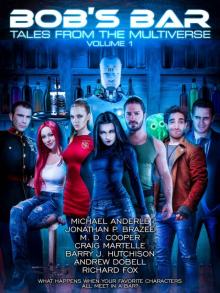 BOB's Bar (Tales From The Multiverse Book 1)
BOB's Bar (Tales From The Multiverse Book 1)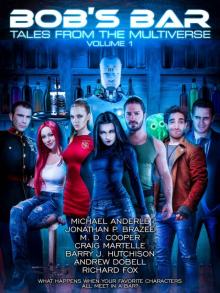 BOB's Bar
BOB's Bar Forever Defend
Forever Defend One Bad Decision: An Urban Fantasy Action Adventure (The Unbelievable Mr. Brownstone Book 10)
One Bad Decision: An Urban Fantasy Action Adventure (The Unbelievable Mr. Brownstone Book 10) Bitch's Night Out (Frank Kurns Stories of the UnknownWorld Book 2)
Bitch's Night Out (Frank Kurns Stories of the UnknownWorld Book 2) Capture Death (The Kurtherian Gambit Book 20)
Capture Death (The Kurtherian Gambit Book 20) SUED FOR PEACE
SUED FOR PEACE Goddess Complete
Goddess Complete The Darkest Night (The Second Dark Ages Book 2)
The Darkest Night (The Second Dark Ages Book 2) The Kurtherian Gambit Omnibus 05 - The Fans Version: My Ride is a Bitch - Don't Cross This Line - Never Submit
The Kurtherian Gambit Omnibus 05 - The Fans Version: My Ride is a Bitch - Don't Cross This Line - Never Submit Eye For An Eye
Eye For An Eye kurtherian gambit 23.7 - tales of feisty druid 07
kurtherian gambit 23.7 - tales of feisty druid 07 Payback Is A Bitch (The Kurtherian Endgame Book 1)
Payback Is A Bitch (The Kurtherian Endgame Book 1) Bite This
Bite This Eye For An Eye: An Urban Fantasy Action Adventure (The Unbelievable Mr. Brownstone Book 3)
Eye For An Eye: An Urban Fantasy Action Adventure (The Unbelievable Mr. Brownstone Book 3) Dawn Arrives
Dawn Arrives Eye For An Eye_An Urban Fantasy Action Adventure
Eye For An Eye_An Urban Fantasy Action Adventure Bite This (The Kurtherian Gambit Book 4)
Bite This (The Kurtherian Gambit Book 4) She Is The Widow Maker_An Urban Fantasy Action Adventure
She Is The Widow Maker_An Urban Fantasy Action Adventure Bitch's Night Out
Bitch's Night Out Never Submit
Never Submit My Ride is a Bitch (The Kurtherian Gambit Book 13)
My Ride is a Bitch (The Kurtherian Gambit Book 13) Hail To The King
Hail To The King SUED FOR PEACE (The Kurtherian Gambit Book 11)
SUED FOR PEACE (The Kurtherian Gambit Book 11) Death Becomes Her
Death Becomes Her Might Makes Right (The Kurtherian Gambit Book 18)
Might Makes Right (The Kurtherian Gambit Book 18) When Angels Cry_An Urban Fantasy Action Adventure
When Angels Cry_An Urban Fantasy Action Adventure Ahead Full (The Kurtherian Gambit Book 19)
Ahead Full (The Kurtherian Gambit Book 19) My Ride is a Bitch
My Ride is a Bitch Queen Bitch (The Kurtherian Gambit Book 2)
Queen Bitch (The Kurtherian Gambit Book 2) Fight Fire With Fire_An Urban Fantasy Action Adventure
Fight Fire With Fire_An Urban Fantasy Action Adventure Compelling Evidence
Compelling Evidence Life Goes On
Life Goes On It's Hell To Choose (The Kurtherian Gambit Book 9)
It's Hell To Choose (The Kurtherian Gambit Book 9) Life Goes On (The Kurtherian Gambit Book 21)
Life Goes On (The Kurtherian Gambit Book 21) Forever Defend (The Kurtherian Gambit Book 17)
Forever Defend (The Kurtherian Gambit Book 17) Feared By Hell: The Revelations of Oriceran (The Unbelievable Mr. Brownstone Book 1)
Feared By Hell: The Revelations of Oriceran (The Unbelievable Mr. Brownstone Book 1) Might Makes Right
Might Makes Right Love Lost
Love Lost TKG08 WE WILL BUILD Rel 01
TKG08 WE WILL BUILD Rel 01 Never Forsaken
Never Forsaken WE WILL BUILD
WE WILL BUILD Queen Bitch
Queen Bitch She Is The Widow Maker
She Is The Widow Maker Rejected By Heaven_An Urban Fantasy Action Adventure
Rejected By Heaven_An Urban Fantasy Action Adventure Never Submit (The Kurtherian Gambit Book 15)
Never Submit (The Kurtherian Gambit Book 15) Darkest Before The Dawn (The Second Dark Ages Book 3)
Darkest Before The Dawn (The Second Dark Ages Book 3) Payback Is A Bitch
Payback Is A Bitch Bring The Pain_An Urban Fantasy Action Adventure
Bring The Pain_An Urban Fantasy Action Adventure You Don't Touch John's Cousin (Frank Kurns Stories of the UnknownWorld Book 1)
You Don't Touch John's Cousin (Frank Kurns Stories of the UnknownWorld Book 1) Capture Death
Capture Death Ahead Full
Ahead Full